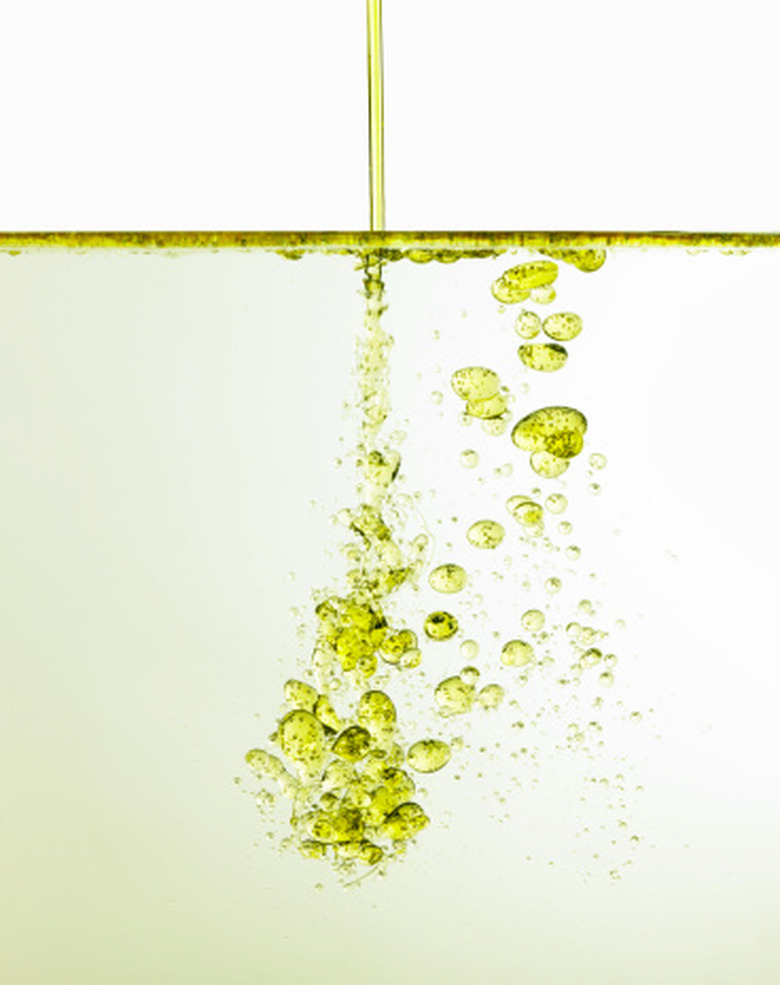Science Projects On Separating Oil And Water
While oil and water do not mix and so will naturally separate, it can be difficult to actually remove the oil from the water. Large oil spills, such as the Exxon Valdez tanker spill in 1989 and the BP Deepwater Horizon incident in 2010, highlight the importance of this issue. There are several interesting science projects, ranging from simple to advanced, that illustrate different approaches to oil separation.
Natural Separation
Natural Separation
One project you can do with oil and water is to show the natural separation of the two liquids. Put some water in a clear container and add food coloring to make the separation more obvious. Pour in some oil; it can be cooking oil, motor oil or some other kind. The oil may initially drop to the bottom due to the force of falling, but it will quickly rise to lie on top of the water. If you cap the container and turn it upside down, the oil will still make its way to the top. This experiment shows two scientific principles. First of all, the water and oil do not mix because they are very different chemically. The water is polar, which means each molecule has parts with small positive and negative electric charges. Oil is very nonpolar, which is why it doesn't mix well with polar liquids. As well, the density of oil is lower than water, so it naturally rises up, just like a helium balloon rises in air.
Separating an Emulsion
Separating an Emulsion
Take the container holding water and oil and shake it vigorously. The mixture will turn cloudy and you won't see two obvious layers anymore. You have made what is called an emulsion. An emulsion is a mixture of oil and water in the form of tiny droplets of the two liquids. Some common foods we eat are emulsions of oil and water, like salad dressing. An oil spill in a wavy ocean could form an emulsion, making the oil difficult to separate. You can experiment with ways to break the emulsion. Let your emulsion sit undisturbed for awhile and the oil may again form a separate layer. Adding salt to the mixture is one way to speed up the process; the salt dissolves in the water and makes it even more polar and less likely to mix with the oil.
Absorbance
Absorbance
Another way to separate oil from water is to soak up the oil. Most absorbent materials we use, like paper towels, are better at soaking up water, but pads made from polypropylene work the opposite way. This is because polypropylene is nonpolar like the oil and so prefers to absorb the oil layer. Polypropylene pads can be bought at auto supply stores and other outlets. Possible experiments could include testing which brand of pads works best and how long it takes to absorb a set quantity of oil.
Temperature
Temperature
Water will become less dense when frozen into ice and this gives us another technique to separate oil and water. Although this would not be practical on a large scale, you can use it on a small scale to illustrate how densities change with temperature. Place some water and oil into a concave container, like a plastic bowl. The oil will rise to the top. Put the container in the freezer for a few hours and then take it out. The container will now have the oil on the bottom, underneath a slab of frozen water that you should be able to remove, thus separating the two.
Bioremediation
Bioremediation
Strangely, there are bacteria that will eat oil spills. One such bacteria that scientists have experimented with is Pseudomonas. A challenging but fascinating experiment can be carried out by mixing colonies of Pseudomonas with different types of oils and nutrients and seeing which conditions give the best bacterial growth rates. This type of experiment should always be done with caution though since some strains of Pseudomonas can cause disease in humans.
Cite This Article
MLA
Judge, Michael. "Science Projects On Separating Oil And Water" sciencing.com, https://www.sciencing.com/science-projects-separating-oil-water-8029374/. 24 April 2017.
APA
Judge, Michael. (2017, April 24). Science Projects On Separating Oil And Water. sciencing.com. Retrieved from https://www.sciencing.com/science-projects-separating-oil-water-8029374/
Chicago
Judge, Michael. Science Projects On Separating Oil And Water last modified August 30, 2022. https://www.sciencing.com/science-projects-separating-oil-water-8029374/
